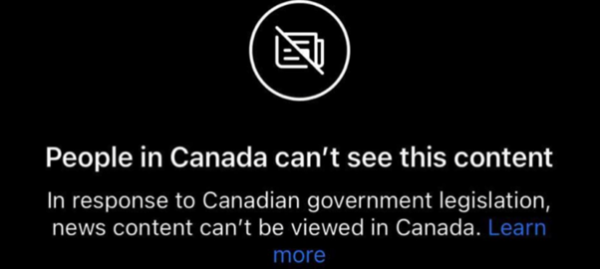Donald Trump convinced himself and a lot of Americans he could build a wall at America’s southern border and make Mexico pay for it.
It was an obviously terrible idea. And, unsurprisingly, it did not go well. Hundreds of miles of walls were built. But they weren’t very effective. And the money to pay for it largely came out of the US defence budget. Some parts of the wall cost $46 million per mile.
A lot of New Zealand’s newspapers have convinced themselves and the New Zealand government that they can have a whole lot of new newsmedia funding and make Big Tech platforms pay for it.
It is also an obviously terrible idea.
There are reasonable arguments, or at least defensible ones, favouring public support for news. But that funding should come from general government revenue.
Newspapers, and the government, seem to believe that making tech companies pay for clicks is a kind of user-pays system. It really isn’t. And to see why, we need only look across America’s northern border to Canada.
Canadian newspapers face the same financial strife as newspapers everywhere.
For decades, classified ads paid the bills. Then classified ads went to online auction sites that are far better at matching buyers with sellers. And then online platforms became very effective ways for advertisers to reach potential buyers, and newspaper advertising revenues declined.
The Canadian papers figured that a tax on links from Google and Facebook would be just the thing for boosting revenues. They’d have the news, and make Big Tech pay for it.
The proposal is offensive to anyone who came of age with the Internet. The web was built on a principle of free linking. Sites link to other sites without having to ask the permission of anyone. And if a site does not want to be indexed, it need only say so in a small file called robots.txt. It can also set a paywall. Simple.
But even if you’re happy to overturn the principles on which the free web was established, there’s another problem.
You can’t make someone pay for something that they don’t really value if they have the option to just not play that game.
If you charge Google, or Facebook, or anyone else for linking to your site – they can decide not to link.
The Canadian government passed Bill C-18, the Online News Act. And now, Canadians wanting to link to a news story on Facebook see this notice instead:

Earlier this week, I interviewed the University of Ottawa’s Professor Michael Geist about the problem. He’s the Canada Research Chair in Internet and E-Commerce Law and has been following C-18 more closely than anyone.
Bill C-18 requires Facebook to pay whenever a user puts up a link to a news site. It is not a cost that Facebook can easily control or predict. It brings potentially unbounded liability.
News links are not particularly valuable to Facebook. If anything, links to news stories encourage users to click away from Facebook rather than stay on the site scrolling through pictures of relatives’ pets and children, and seeing ads delivered through Facebook while they’re there.
If allowing links to news sites doesn’t provide much value to the company while bringing potentially massive liability, of course they will build an engine to block links. So they did.
First they warned the Canadian government that this would happen. The government thought it was a bluff.
Then they trialled for more limited set of users. The government still thought it was a bluff.
Finally, on 1 August, Facebook began pulling the plug. Canadian Facebook users will no longer see news links and content. It affects not just Canadian news sites but also international news for Canadian readers, because the Online News Act can also be read as requiring payment for links to international sites too.
The big newspapers are getting exactly what they asked for. They thought that Facebook was stealing from them by linking. It’s always been nonsense – even the report commissioned by New Zealand’s Ministry of Culture and Heritage found that “Digital platforms provide considerable commercial benefits to news firms.”
But, like Trump, they’d convinced themselves that they could have something for nothing. They could have media funding and make Big Tech pay for it. And it’s worked out about as well as Trumps’s wall.
Professor Geist explained that some of the biggest losers from Bill C-18 have been small independent news sites that have relied on links from Facebook for traffic.
I hope that our Minister for Broadcasting and Media, Hon Willie Jackson, is paying attention to Canada’s cautionary tale.
Extorting payments from platforms to meet the government’s news funding objectives isn’t just thuggish. It also doesn’t work.



